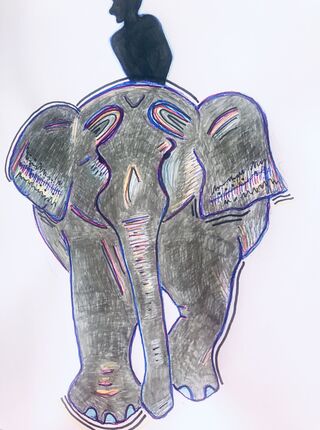Career
How to Control Your Mind
A goal of psychology is controlling yourself. Modern psychology can help.
Posted May 19, 2020 Reviewed by Jessica Schrader

When I taught “Introduction to Psychology,” we covered four main goals of psychology: to describe, explain, predict, and control behavior (Coon, Mitterer, 2013). The idea of control is ultimately self-control, as many who have been in therapy will tell you. But, as almost everyone can attest, changing behavior, controlling oneself, isn’t as easy as it appears.
The reason for this is eloquently explained by Dr. Jonathan Haidt in his excellent book, The Happiness Hypothesis. Though I have certainly heard the science behind difficulty controlling oneself before, he puts it unmistakably clearly.
When describing the forming of the brain over millions of years, Haidt explains that human’s automatic processes, the more animal part of the human brain which controls quick reactions to threats and opportunities (stimulus response), respond to pleasure and pain. They also include our gut feelings and emotions, and they “have been through thousands of product cycles and are nearly perfect” (p.15). He is not saying they make the right decision; he is saying the majority of the time humans' automatic processes do exactly what they are designed for. He uses the metaphor of this part of the brain being the elephant.
He describes the newest part of the human brain, which controls logic, as still having quite a few bugs. He describes this part of the brain as the rider on the elephant. Though we may see the rider as in control, Haidt describes him more as an advisor. He makes it clear the “rider evolved to serve the elephant” (p.16), not vice-versa. This is evolutionary theory. However, we have been socialized through school, religious morals, and of course family, to believe we can control our base instincts, drives, and emotions. And we do. We are driven by desires early in life and socialized to be more rational. But how effective is all this socialization? The eighteenth-century philosopher David Hume did not feel very much so when he said, "Reason is, and ought only to be the slave of the passions, and can never pretend to any other office than to serve and obey them” (Haidt, p. 17).
But pretend, most of us do. As I have written in the past, our minds are consistently misrepresenting reality and basically deceiving us for what the mind determines to be the best (see "Top 20 Ways You Are Lying to Yourself," "Can’t Trust Thinking Then What?" and "The Truth Will Not Set You Free"). In his book, Everything Is F*cked, Mark Manson describes the mind as a car. He says, “there are two travelers in your Consciousness car, a Thinking Brain and a Feeling Brain” (p.31). He goes on to say though humans assume the Thinking Brain is driving the Consciousness car, that no matter how smart or logical you think you are, “[y]ou’re a crazy Feeling Brain-piloted meat robot just like the rest of us” (p.33).
An excellent experiment supporting the power of unconscious processes influence over much of one’s motivation is provided in Haidt’s book (p.13). Some word problems are given to subjects. The word problems are easy, simply making four-word sentences out of the five words provided. When the subject is finished, she enters the hallways as instructed to let the experimenter know she is done. The experimenter is talking to someone, with her back turned to the subject. Whether or not the subject interrupts, or waits 10 minutes to be acknowledged, comes down to whether or not there were “rude” words, or words related to politeness, in the sentence. The unconscious process, affected by the words worked on a few minutes before, decided whether it was better to wait or interrupt.
Manson, Haidt, psychology researchers of confabulation, myself, and many others fascinated by psychology come to the same conclusion: Your brain consistently tricks you into believing your logic is in control, but generally, it is not. You are being driven by emotions and instinctual drives which your logical brain then rationalizes. This gives the appearance of the logical mind controlling the subconscious drives. We work hard at gaining self-control, often failing, because of this illusion. In some instances people have developed and enhanced self-control, there is no doubt. The best avenue is to train the emotional/instinctual part of the brain while creating an external world which reduces the stimulus this part of the brain will react to.
Adjusting the external world is common sense, and many do this when trying to change behavior, for example, when dieting people remove sweets from the house. Those in addiction recovery are advised to avoid people, places, and things associated with their addiction. Though this is effective in reducing triggers for stimulus response, everything cannot be avoided, and internal triggers (memories, cravings, emotions, habits) still exist. To gain better control of this, or in other words, to practice mind control, training of the animal part of the brain (the elephant) is necessary.
Haidt offers three suggestions related to this: meditation, cognitive-behavioral therapy, and when the mind leads to unhappiness (as it naturally does) excessively and becomes dysfunctional, anti-depressant medication. As many of my readers know, I often combine the first two and use strategies from mindfulness-based cognitive therapies (MBCT, ACT, DBT). Meditation contributes to mindfulness. As Robert Wright proclaims, “Viewing your feelings mindfully while on a meditation cushion can make you better at viewing them mindfully in everyday life, which means your life will be less governed by misleading or unproductive feelings” (p.50). Mindfulness increases control over the modules of the mind (evolutionary and conditioned needs that take the lead when that need becomes prevalent). With that, one can be less affected by thoughts and especially feelings, which are driven by the “elephant” part of the brain.
In Buddha’s Brain, Rick Hanson helps the reader understand the neuroscience of behavior. He describes top-down reasoning (the rider) and bottom-up motivating factors (the elephant). He offers information, suggestions, and exercises to help make this system more efficient. He reasons that both bottom-up and top-down approaches have their advantages (logic without motivation is useless, and emotional and instinctual drives without temperance is reckless). One must work to utilize both systems effectively, and certainly, a calm mind is more apt to do this than an emotional one.
Here is where I repeat the gist of my writing: The beginning of controlling your mind is recognizing it is deceiving you, or at the very least, questioning your thinking. This is an outcome of both cognitive therapy and meditation. With the ability to question thinking comes leaving the “default mode network,” which is the wandering mind. This allows you to be the calmer, more rational “you” that underlies your stream of thought.
This is also the beginning of mindfulness. Wright discusses how his meditation teacher pointed out how good it is that he caught his mind wandering in meditation (though he reported it wandered a great deal, which is normal). His teacher focused on the fact that he caught it, which is leaving the default mode network. The more you catch it, the more control you have over it. The more you question it, or simply accept it is deceiving you, the more control you have. The more you practice, the more you become the person you choose to be, rather than the basic, animal side of you that reacts to stimuli.
While talking to a friend recently, she discussed how her daughters say they want to work out with her. However, when she is about to work out and asks, they say they are not feeling it. They made a decision in one state (the rider, the logical part of the mind) but allowed the elephant (the feeling, animal, part of the mind) to make the decision in the moment. As such, they never work out. I have written before about how from an evolutionary perspective the brain seeks to conserve energy for unforeseen battles that lie ahead. However, the animal part of the brain formed millions of years ago, when threats abound. We no longer need to conserve our energy to run or fight threats. But, when in default mode network, we allow the animal mind to make the decision.
Exercise is a great place to begin to retrain your mind. I exercise almost daily. Most of those days a voice in my head (the elephant) tells me I do not need to. It provides excuses that support not doing it. When I am beginning to feel strained the voice tells me I can quit, and provides a bunch of reasons it is okay. This is the elephant. Or, as David Goggins calls it, the governor on your motor (p.210). Recognizing this is the mind doing what it does and not taking it as truth is how to overcome it and be the person you want to be. Exercise isn’t the only place, and chances are you are doing this in some ways already. Perhaps it is with diet, or work you need to do, or just small habits you have changed.
This is where acceptance and commitment training can help. While in a logical state, think about what you want to change. Think of who you want to be. Then commit to it. When your animal mind provides reasons not to do it (I’m not feeling it, I’m tired, I’ll start tomorrow, it’s too hard, I’m not doing well, etc.) remember this is your mind deceiving you. You needn’t listen to it. Accept that your mind does this. Accept the thoughts as just thoughts, not truths. You can remember what you committed to and act on that. You can remember that change is difficult, and you are not going to master it right away. You will fall short perhaps more than you succeed. No one is mindful 100% of the time. You will, at times, react rather than respond. Be gentle with yourself. But keep practicing. Keep trying.
This takes commitment. But mindfulness becomes easier with the knowledge of how the mind works (elephant and rider, default mode network, module theory of mind), with the realization your mind deceives you most of the time, with the realization thoughts are just thoughts, and with the commitment to change.
In a recent podcast, Dr. Julia Shaw, a scientist who specializes in the fallacy of memory, proclaimed, “Once you get through the existential crisis and you question all memories, including important ones, you come out the other side and hopefully you end where I am, which is that you realize that in some ways this is incredibly liberating” (McRaney, D., 2020). To me, the same is applicable to all thinking. To question it, to doubt it, to view it as deceptive, is liberating. It takes practice. But don’t let your elephant mind talk you out of doing it.
Copyright William Berry, 2020.
References
Coon, D., Mitterer, J. (2013). Introduction to Psychology: Gateways to Mind and Behavior.
Goggins, D. (2018). You Can’t Hurt Me: Master Your Mind and Defy the Odds. Goggins Built Not Born, LLC.
Haidt, J. (2006). The Happiness Hypothesis: Finding modern truth in Ancient Wisdom. Basic Books, New York, N.Y.
Hanson, R. (2009). Buddha’s Brain; The Practical Neuroscience of Happiness, Love, and Wisdom. New Harbinger Publications, Oakland, CA.
Manson, M. (2019). Everything is F*cked: A Book About Hope. Harper Collins, New York, N.Y.
McRaney, D. (2020, May 3). The Memory Illusion. [Audio Podcast]. https://omny.fm/shows/you-are-not-so-smart/179-the-memory-illusion
Wright, R. (2017). Why Buddhism is True. Simon and Schuster, New York, N.Y.




